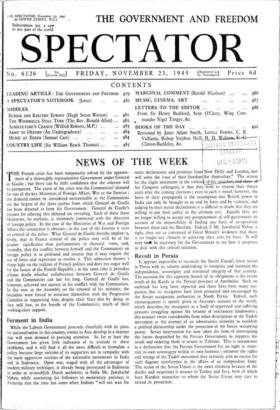Ferment in India
While the Labour Government proceeds cheerfully with its plans for nationalisation in this country, events in Asia develop in a manner that will soon demand its pressing attention. So far at least the Government has given little indication of its attitude to these problems, and it will find it all the more difficult to formulate a policy because large sections of its supporters are in sympathy with the most aggressive sections of the nationalist movements in India and in Indonesia. Open war, waged with all the advantages of modern military technique, is already being prosecuted in Indonesia in order to re-establish Dutch authority; in India Mr. Jawaharlal Nehru, while cautioning his followers to momentary patience, is declaring that the time has come when Indians " will not wait for more declarations and promises fro New Delhi and Londona_but will solve the issue of their freedom for themselves." The reason for the slight abatement in the violen of hi his Congress colleagues, is that they wish to reserve then forces until after the coming elections ; even in such a mood, however, the basis of their propaganda is the assumption that British power in India can only be brought to an end by force and by violence, and judging by their recent declarations it is difficult to doubt that they are willing to put their policy to the ultimate test. Equally they are no longer willing to accept any postponement of self-Rvernment on account of the impossibility of finding any basis of co-operation between them and the Muslims. Indeed, if Mr. Jawaharlal Nehru .s right, they are so convinced of Great Britain's weakness that there is no longer any obstacle to achieving their aims by force. It will very-seeei be necessary for the Government to say how it proposes to deal with this critical situation.


























